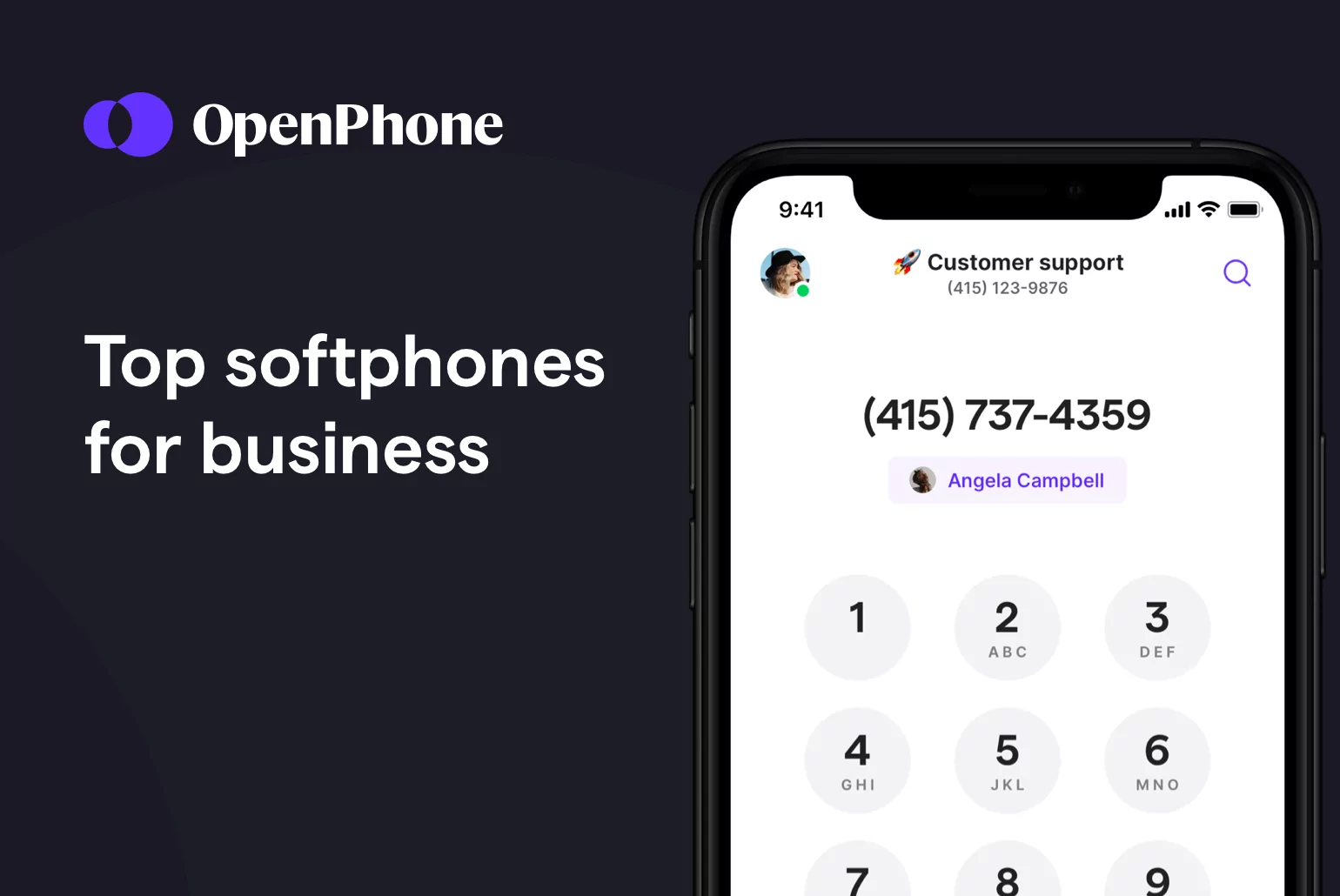Looking to select a softphone for business?
Below, we provide an overview of some of the best Voice over Internet Protocol (VoIP) services. We’ll discuss key features and limitations to help you select the best softphone for business.
Top softphones business providers compared
Here’s a quick breakdown of how the top softphones for business stack up based on pricing and basic calling features. Keep reading below as we cover each provider in more detail including their specific plans and feature sets.
| Provider | Price | SMS/MMS to US & Canada | Shared phone numbers | Additional phone numbers |
|---|---|---|---|---|
| OpenPhone | Starts at $15 per user per month | ✓ | ✓ | $5 per number per month |
| RingCentral | Starts at $19.99 per user per month | ✓ | ✓ | $4.99 per number per month |
| Line2 | Starts at $13.75 per month | ✓ | X | $14.99 per number |
| Nextiva | Starts at $23.95 per user per month | Requires upgrade | ✓ | Requires the purchase of an additional user seat |
| Ooma | Starts at $19.95 per user per month | Requires upgrade | ✓ | $9.95 per number per month |
| Grasshopper | Starts at $28 per month | Local numbers only | X | $10 per number per month |
| Phone.com | Starts at $11.99 per user per month | ✓ | $5 per month | $15.99 per number per month |
| Bria | Starts at $15 per user per month | For US & Canadian customers only | ✓ | Requires upgrade |
| GoTo Connect | Starts at $24 per user per month | For US & Canadian customers only | ✓ (up to 8 phones) | $5 per number per month |
Breaking down the best softphones for business
Our top picks include a wide range of services and apps that suit different types of customers. For example, RingCentral focuses on enterprise users, while OpenPhone is ideal for growing teams and small businesses.
When selecting the best softphone for business, look for the right feature set. You might not need features like multi-site management if you’re a small team.
Why pay for features you don’t need? Instead, focus on finding a softphone app and plan that best fits your needs and budget. With that in mind, here are the nine best softphones for business.
1. OpenPhone: Best softphone app for growing businesses
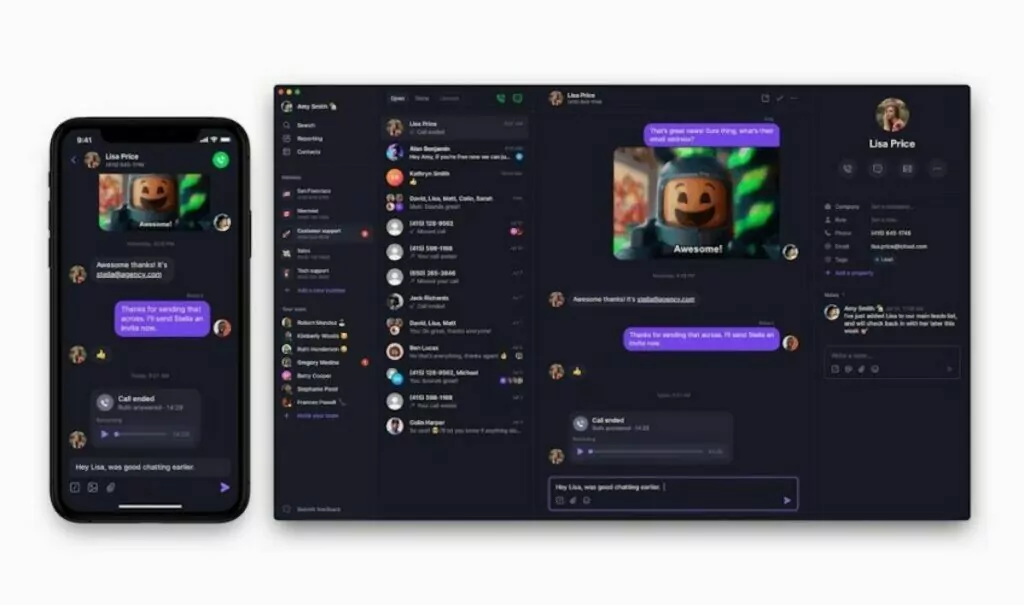
OpenPhone is a modern VoIP softphone that can scale as your team and business grow. You can keep adding accounts on OpenPhone as you add members to your team.
Each team member can have a separate US, Canadian, and toll-free number. Or you can share access to phone numbers with teammates to respond to calls and texts.
Need to streamline communications? OpenPhone lets you automate routine communication.
You can set up auto-replies to respond to the most common questions. Or use a phone menu to let clients route calls to the right person or department themselves — no receptionist needed. Plus, save time on repeat text messages by using snippets.
OpenPhone integrates with many business apps like HubSpot, Slack, and Gong, so you can seamlessly exchange information without manual effort. You can also use the Zapier integration to automate repetitive tasks and exchange information with other apps OpenPhone doesn’t directly integrate with.
Easily access OpenPhone from most devices. OpenPhone gives your team a softphone for Mac, Windows, Android, iOS, and most web browsers.
Signing up for a free trial and getting up and running only takes minutes. Then your team can use OpenPhone’s web, desktop, and mobile apps.
Key features
- Free calling and texting to US and Canadian numbers
- MMS support
- Group messaging
- Shared phone numbers
- Desktop, web, and mobile apps for Windows, Mac, Android, and iOS
- Phone menu (also known as an auto-attendant or IVR)
- Call recording
- Business app integrations (HubSpot, Gong, Google Contacts, Slack, webhooks, and Zapier)
- Voicemail transcriptions
- Scheduled text messaging
Pricing
- Starter: $15 per user per month
- Business: $23 per user per month
- Enterprise: Contact for custom pricing
2. RingCentral
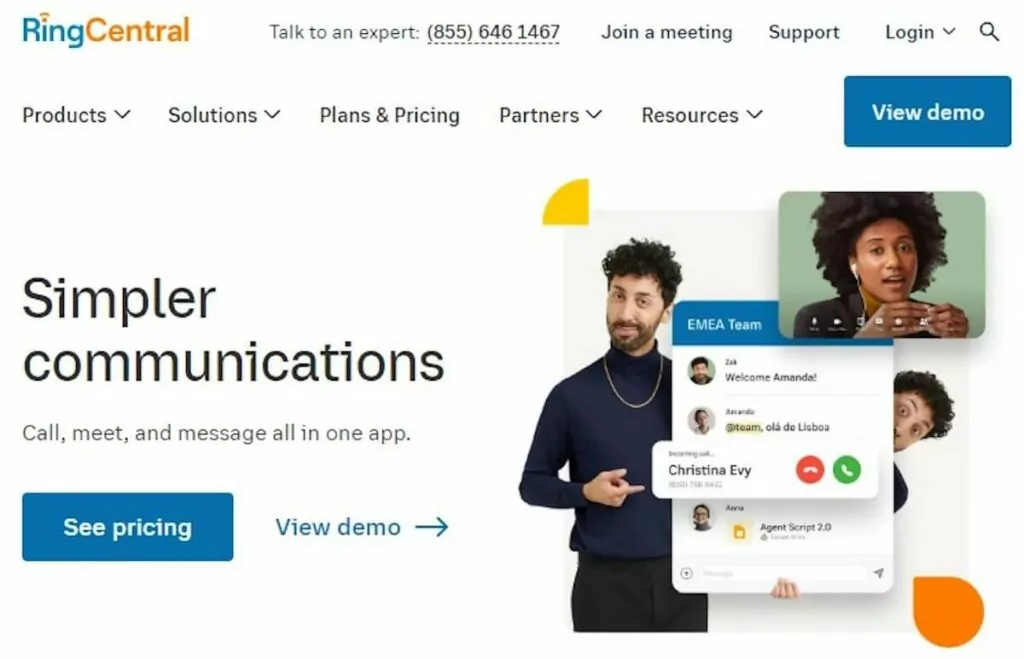
RingCentral is a leading business phone system tailored for enterprise users.
Their base plan is bare bones but includes advanced features such as voicemail-to-text and team messaging.
To access key features such as call recording and business app integrations, however, you’ll need to upgrade if you use RingCentral.
RingCentral’s higher-tier plans also include many other bells and whistles that you may end up paying for features you don’t want (such as virtual fax) — just to get the features you need.
Key features
- Unlimited calling in the US and Canada
- Advanced features like call parking and QoS reports (requires upgrade)
- Voicemail transcriptions
- Call recording (requires upgrade)
- CRM integrations (requires upgrade)
- Business app integrations (requires upgrade)
Pricing
- Essentials: $19.99 per user per month (max 20 users)
- Standard: $27.99 per user per month
- Premium: $34.99 per user per month
- Ultimate: $49.99 per user per month
3. Line2
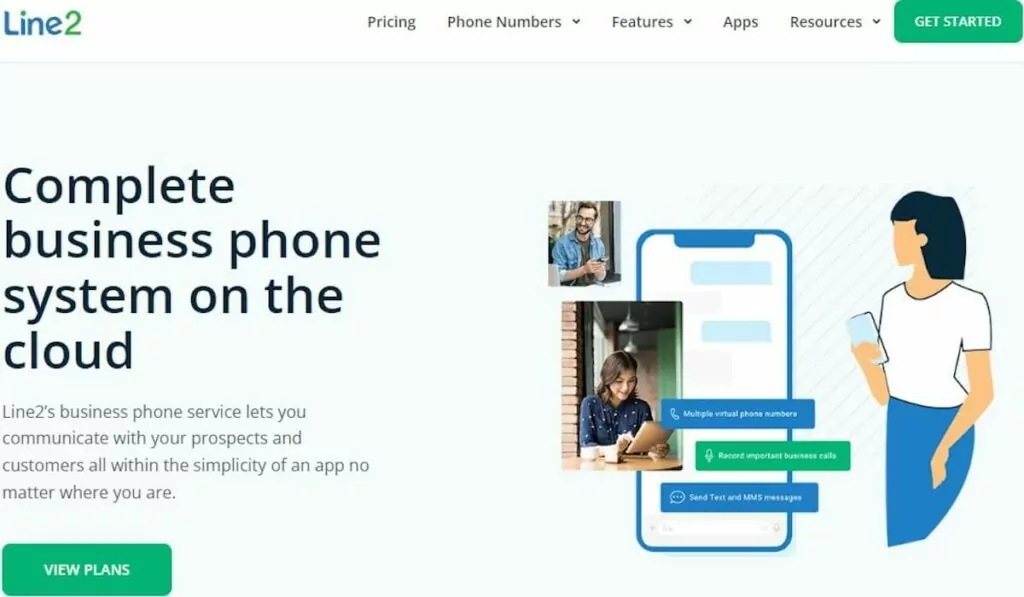
Line2 is a low-cost phone system for small businesses and solopreneurs.
If you need to replace desk phones with a basic softphone app, Line2 might save you a few bucks while the business gains momentum.
With Line2, you get a local number, voicemail transcriptions, and PBX features. You also get useful features like MMS messaging, voicemail transcriptions, and caller ID.
But you don’t get a lot of essential features like auto-replies or integrations. Compared to Line2 alternatives, Line2’s low pricing is less appealing given the basic feature set.
Key features
- Unlimited calling in the US and Canada
- Unlimited domestic SMS
- Desktop and mobile apps
- Voicemail transcriptions
Pricing
- $13.75 per month
4. Nextiva
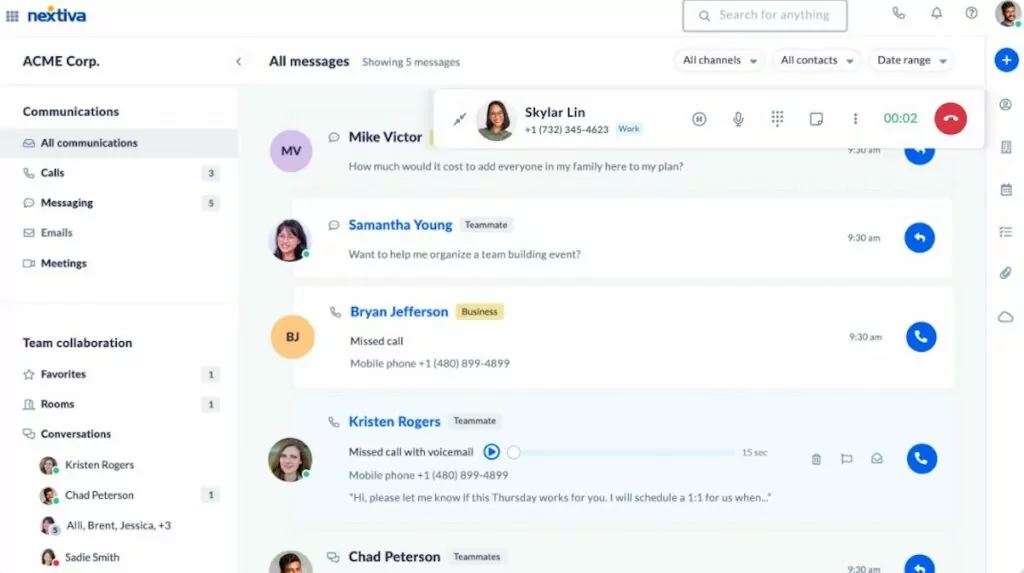
Nextiva is a unified communications system that serves call centers and enterprise users. While Nextiva is popular, it might not be the best option for small businesses.
The Essential plan includes features like unlimited calling and video conferencing, voicemail, toll-free numbers, virtual fax, and Outlook and Google Contacts integrations. But that’s pretty much it.
Nextiva offers most features that make VoIP phone systems powerful in their higher-tier plans. Even basics like SMS are only available on the Professional plan and require you to contact Nextiva each time you add a new number to your account to activate SMS on the number.
If you decide to upgrade, you’ll need to wrap your head around Nextiva’s complex pricing. The price differs based on the number of users, the type of use (business communication vs. contact center), and the duration you subscribe for. To access any Nextiva plans, teams of one to four pay the most per user, with the Essential plan costing $23.95 per user per month (compared to $18.95 per user for a team of 20-99 users).
Also, Nextiva is only available to businesses in the US. For example, if you’re a Canadian business, you can’t use Nextiva’s services.
Key features
- Unlimited voice and video calling in the US and Canada
- SMS (requires upgrade)
- Outlook integration
- Voicemail transcriptions (requires upgrade)
- Auto-attendant
Pricing (for teams of 4 or smaller)
- Essential: $23.95 per user per month
- Professional: $27.95 per user per month
- Enterprise: $37.95 per user per month
5. Ooma
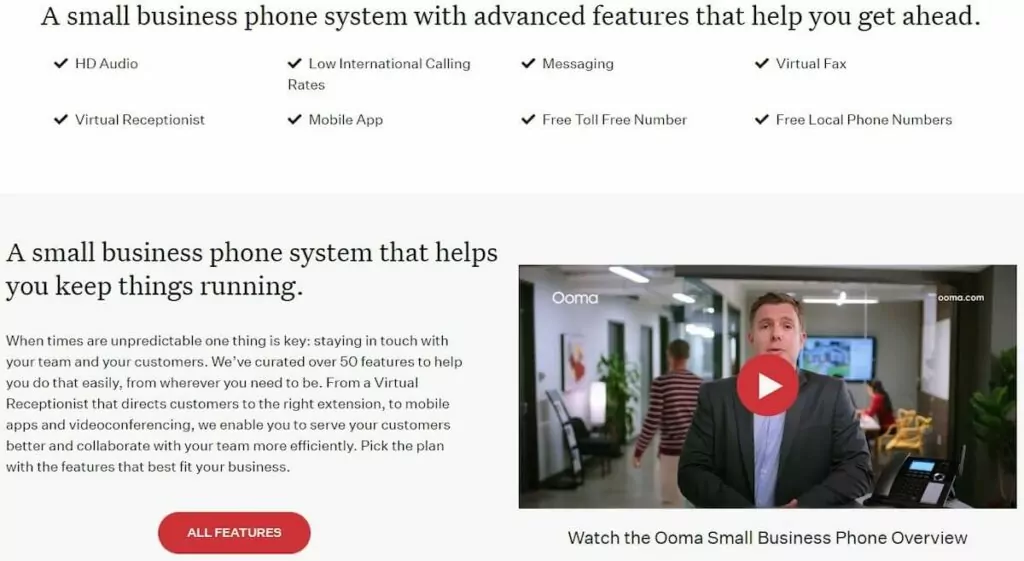
Ooma is a VoIP service for small businesses.
It offers many features even on the Essentials plan. For example, the lowest tier plan includes VoIP call forwarding, virtual fax, virtual receptionist, and unlimited calling in the US, Canada, Mexico, and Puerto Rico.
Ooma’s international calling rates are pretty affordable too.
However, the Essentials plan skips a few basics. For example, you can’t use the desktop app, record calls, or integrate with your Google account unless you upgrade to the Pro plan.
The pricing is straightforward but not inexpensive. The Essential plan costs $19.95 per user per month and offers many features that a small business might not need, such as call flip or overhead paging.
Key features
- Unlimited calling in the US, Canada, Mexico, and Puerto Rico
- Virtual receptionist
- Call transfer
- Virtual fax
- Call park
- Desktop app (requires upgrade)
- Google and Office 365 integrations (requires upgrade)
Pricing
- Essentials: $19.95 per user per month
- Pro: $24.95 per user per month
- Pro Plus: $29.99 per user per month
6. Grasshopper
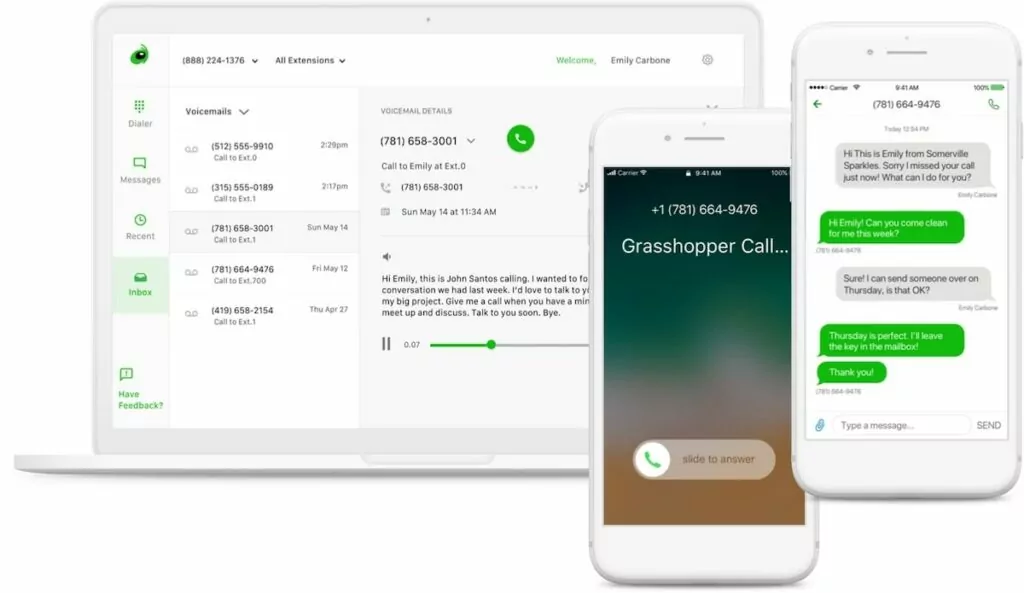
Grasshopper has been around for over two decades. It’s an excellent solution for small teams that want access to all the features a standard VoIP phone service offers.
Grasshopper’s pricing depends on the number of lines and extensions. For example, the Solo plan ($28 per month) offers one phone number, three extensions, and all Grasshopper features.
Their highest-tier plan includes five numbers and unlimited extensions. Grasshopper charges for any additional numbers, but doesn’t share the amount you’ll pay on their website. Instead, you have to contact them directly to know.
While you get access to all features, Grasshopper still doesn’t offer basics like call recording or shared phone numbers. Grasshopper charges $10 per month for simultaneous ring if you wish for your team to share responsibility for incoming calls.
You pay for functionality you might not even need and still won’t be able to access any sort of integrations that can help you streamline your communication.
Key features
- Unlimited calling and texting in the US (except Alaska and Hawaii) and Canada
- Voicemail transcription
- Call forwarding
- Virtual fax
- Custom greetings
Pricing
- Solo: $28 per month
- Partner: $46 per month
- Small Business: $80 per month
7. Phone.com
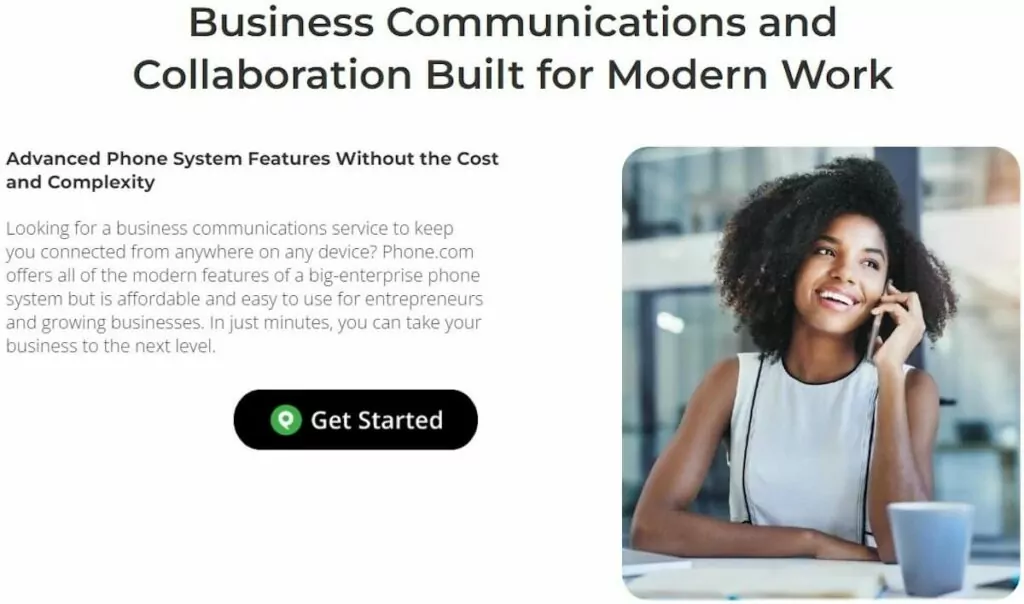
Phone.com is a cost-effective business VoIP system tailor-made for small businesses.
It supports video conferencing, voice calls, and text messaging using all popular operating systems. You can use this softphone on Mac, Windows, iOS, and Android devices.
The problem? The Basic plan only offers 500 pooled minutes. If you go over the limit, you’ll be paying extra for the month.
Phone.com also lacks features like call recording, which costs $8 per month as an add-on.
A few features also limit scalability. For example, even when you select the mid-tier Plus plan, the number of participants in video conference calls is limited to 25 participants.
Key features
- HIPAA-compliant video conferencing
- Video recording (requires upgrade)
- Unlimited calling in the US (requires upgrade)
- Call recording (requires upgrade and available as an add-on)
- CRM integration (requires upgrade)
Pricing
- Basic: $11.99 per user per month
- Plus: $15.99 per user per month
- Pro: $23.99 per user per month
8. Bria
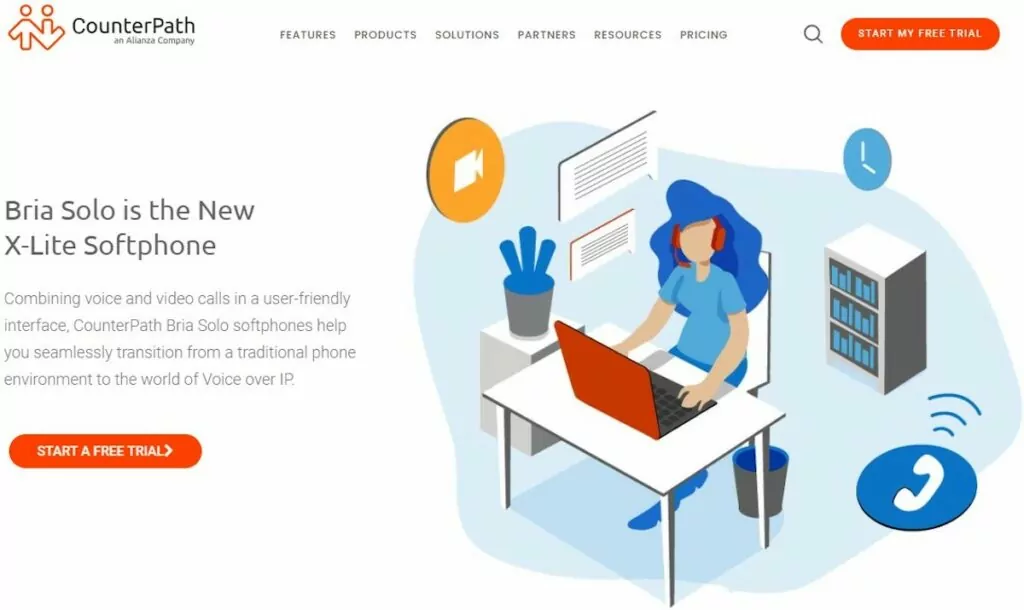
Bria is a softphone service from CounterPath. It’s perfect for teams that don’t need a lot of features as long as the service can offer good call quality and basics like call forwarding.
Bria also has a free, non-commercial plan with standard calling features. But if you’re a business, you pay a starting price of $4.95 per user per month.
For that price, you get features like HD voice and video calls, call forwarding, call recording, call transfer, and team messaging.
If ease of use and low price are higher up on your priority list compared to business-centric phone systems that offer integrations, Bria may meet your needs.
Key features
- Call forwarding
- Call transfer
- Call recording
- Call analytics (data regarding duration, failure reason, and more)
- Team voice and video calls
- Screen sharing
Pricing
- Bria Solo Free (for single users): Free
- Bria Solo (for single users): $2.95 per month
- Bria Teams: $4.95 per user per month
- Bria Enterprise: Contact for custom pricing
9. GoTo Connect
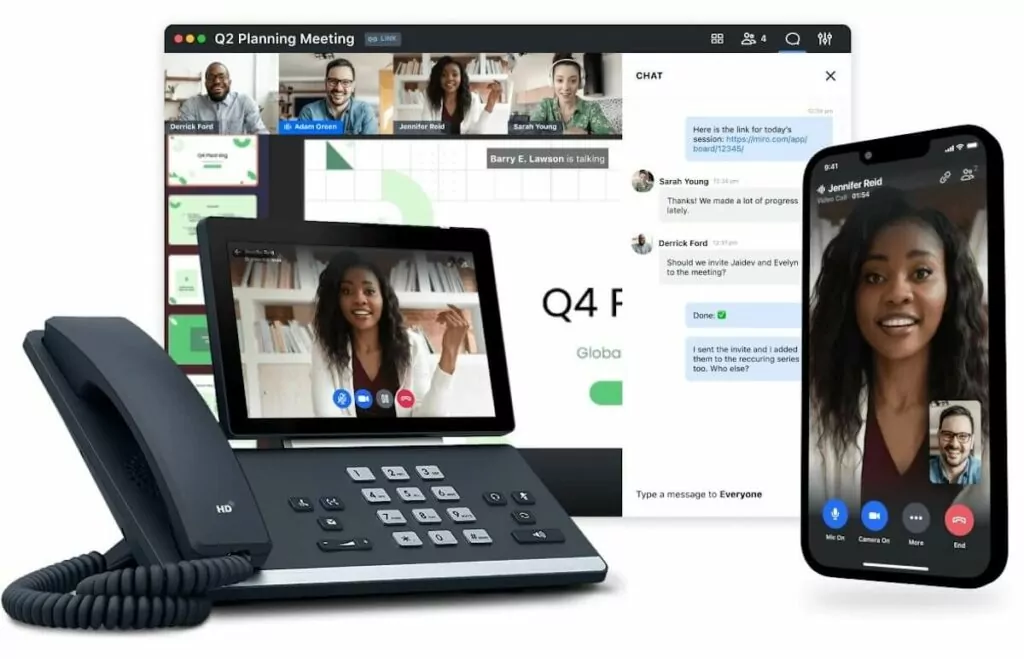
GoTo Connect, formerly Jive, comes loaded with features. While VoIP call routing can sometimes look like a maze, the user-friendly interface makes it simple. For example, GoTo Connect’s call routing system has a drag-and-drop interface with a clear visualization of the customer service call flow.
You get Outlook and Google Workspace integrations and video meetings with up to four participants even on the Basic plan. You’ll need to upgrade if you want to increase the cap on video meeting participants for remote work.
GoTo Connect also has extras like real-time analytics, voicemail to email, and call recording. But you’ll need to upgrade to their Premium plan to access any of these features.
Like Nextiva, their pricing also depends on the size of your team, with teams of two to 10 paying at least $24 per user per month.
Key features
- Video conferencing
- Shared line appearance (SLA)
- Hot desking
- Auto-attendant
- Custom greetings
- Voicemail to email
- Predictive analytics
Pricing for teams of 2-10 users
- Basic: $24 per user per month
- Standard: $29 per user per month
10 key softphone features
The best softphone for businesses should have features that your team might use regularly.
If you need advanced features, you should look for those too. But if you’re only getting started, look through these key softphone features and pick ones that fit your needs.
Compare your priorities to what each softphone app offers to select the right one for your business.
1. Call management
Call management features including call forwarding, call transfer, and phone menu/auto-attendant let you provide a more seamless experience to customers.
Features like an auto-attendant are also a win/win for your team as you don’t need a receptionist to route callers to the right person on your team. Instead, callers can listen to your phone menu greeting and select the best option.
2. Compatibility
The best softphone for business should have apps for all major devices — Windows, Mac, iOS, and Android. That way, your team doesn’t have to buy additional hardware to use your business phone system.
It should also have a web version so you can access it via other devices as long as you have an active internet connection.
A cross-platform softphone also enables team members to field calls and text messages conveniently from their phones. The result? Quick responses to leads and excellent customer support. ✨
3. Call recording
Call recording serves multiple purposes. Teams can listen back to call recordings as a training opportunity to provide better responses, analyze customer interactions using tools like Gong, or screen candidates for a job based on a phone interview. However, you should be mindful of call recording laws.
4. Integrations
You might need to exchange information with other business apps when communicating internally or with clients.
For example, you may want a single source of truth for all communication within your CRM for all your business contacts. An integration can automatically log all your phone communication in your CRM.
The best softphone for business will ensure you hardly ever (preferably never) have to migrate data manually.
5. Voicemail transcriptions
Transcribed voicemails are easy to skim and searchable. It makes the job easier for both internal communications as well as support teams.
It’s also handy — you can read voicemails even when you’re in a loud environment or don’t have your headset.
6. Shared phone numbers
Shared phone numbers make it easy to create a central business line or provide one number for customer support.
Multiple team members (generally from the same department) can manage calls on a single number when it’s shared so your team doesn’t miss calls during working hours.
The team can view client interactions — calls, texts, and voicemails — anytime they need, allowing them to provide excellent experiences.
7. Caller ID
The softphone should provide caller ID for local US numbers. Caller ID displays your business’s name when you call someone.
If the recipient doesn’t have your number saved in their cell phone, caller ID can help build the trust needed for them to pick up.
8. Easy setup
The best softphone for business should be quick and easy to set up and use. You don’t want to spend too much getting started or changing settings — or having to hire someone to configure your phone system.
9. Customer service
Your callers expect quick responses. You’ve got the right people and systems in place, but what happens when one of your tools doesn’t work? You need support, and that’s why VoIP providers must deliver fast, reliable customer service.
A knowledge base is helpful if you can resolve an issue yourself. But when that’s not the case, you can’t wait hours for a solution when you run into a problem. You risk losing your reputation with your callers if something doesn’t work on your end.
10. Transparent pricing
Hidden costs turn into unwelcome surprises. Most providers with transparent pricing have a simple pricing structure too.
Look for a service with upfront pricing. Double-check that pricing for add-ons or additional costs such as international calls is clearly stated.
How much does a softphone cost?
The cost of softphones can vary greatly depending on the feature set and performance. If you’re about to invest in a softphone, check out our VoIP cost calculator to estimate the total cost.
What is a softphone system?
A softphone is a software solution that lets you make phone calls and send and receive texts via the internet. Softphone systems can replace traditional phone systems, allowing teams to stay connected wherever they are from their computer or mobile device.
What are the benefits of softphones?
Businesses invest in softphones for various reasons. The benefits of a softphone can help businesses achieve goals or efficiency. Here are a few benefits of softphones:
Work from anywhere: Modern businesses need communication services that work on all devices, not just desk phones tied to their cubicle. Softphones allow teams to communicate through computers and cell phones as long as they have an internet connection.
Cost-effective: Why invest in all that hardware when you can just use a BYOD (bring your own device) policy? More than 80% of companies have a BYOD policy of some kind, so it makes sense to allow team members to use their personal devices to stay connected. Combine BYOD with OpenPhone, which costs $15 per user per month, and you get a very cost-effective business phone solution for your team.
Scalability: Desk phones and related hardware need real estate and cost more to upkeep. Softphones save you plenty of office space by being available on the devices your team uses for the rest of their work, making the system more scalable.
Separate numbers: Even when you and your team use a softphone on your personal phone, you can keep personal and business calls separate by getting a second number.
Join OpenPhone: The best softphone for business
OpenPhone is the best softphone for business because it offers a mix of features, business-friendly pricing, and reliable support. For $15 per user per month, you get features like auto-replies, auto-attendant, and integrations with email, Slack, Zapier, and webhooks. The best part? No hidden costs.
If that sounds intriguing, start a free, seven-day trial of OpenPhone and experience the service yourself.
Top softphone apps for businesses stand out with a diverse range of features, including call recording, seamless integration with various business tools, voicemail transcription, number sharing, caller ID, easy setup, exceptional customer service, clear pricing, and remote work capabilities for improved scalability and efficiency.
Depending on the solution, most softphones can integrate with CRM software. This allows for automatic logging of all phone communication, making it easier to keep track of customer interactions.
Implementing softphone systems in a remote work environment streamlines communication by providing seamless connectivity across devices and locations, significantly enhancing collaboration and productivity among remote teams.
